At the turn of the 2010s, Stephen Yarrow decided he’d had enough of London. In fact, he’d had enough of Britain altogether.
Growing up in Willesden, Finchley and Edgware in the 1960s, the north London the one-time Thames TV film editor called home was no longer one he recognised.
As a Jewish man living in an area with one of the highest concentrations of Jews in the capital, he felt rising hatred towards his kin would only get worse.
‘I was seeing more and more antisemitism, more and more Jewish schools being attacked, more and more synagogues being attacked,’ he said.
Despairing at the cost of his mortgage in Edgware and unhappy at the state of Britain, he began plotting his life abroad in retirement and with Barbara made a move popular with an increasing number of Brits, to the furthest reaches of Europe: Bulgaria.
The pair, both 67, snapped up a three-bed, two-bathroom bungalow with air conditioning and a swimming pool for £54,000, paying £5,000 to a professional moving company to shift the furniture from each of their homes.
Moving to a village near the city of Dobrich in north-east Bulgaria was ‘frightening’ at first, he tells MailOnline – with huge cultural differences, occasional power cuts and sweeping changes to everyday life to digest in the former Communist state.
But watching crime rates spiral and antisemitism ferment in his home city from 1,400 miles away, and with the beach just a few miles away, the Jewish retiree says he couldn’t be happier – and says he will never live in the UK again.
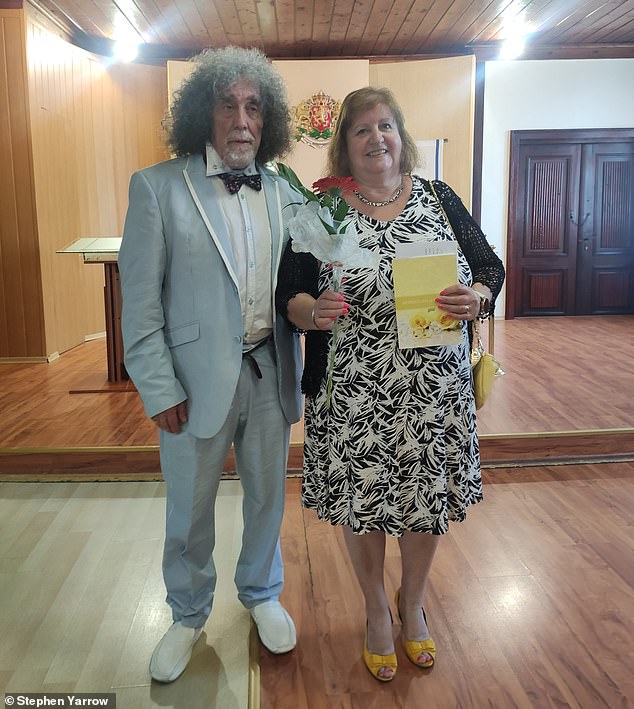
Stephen Yarrow and his wife Barbara, both aged 67, ditched Britain for a life in Bulgaria and say they will never live in the UK again
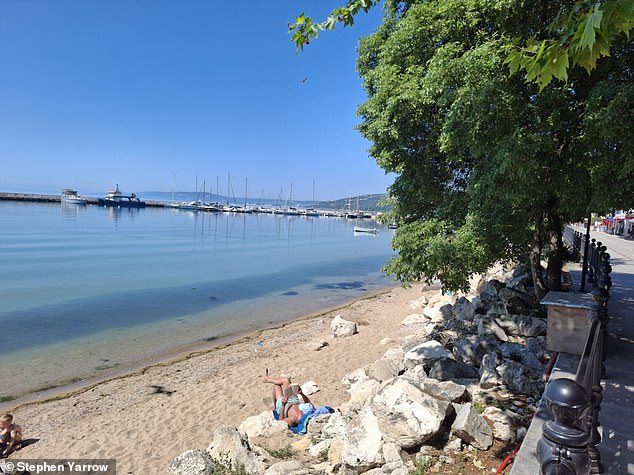
The pair moved to a village near the city of Dobrich in north-east Bulgaria, with a sandy beach right on their doorstep
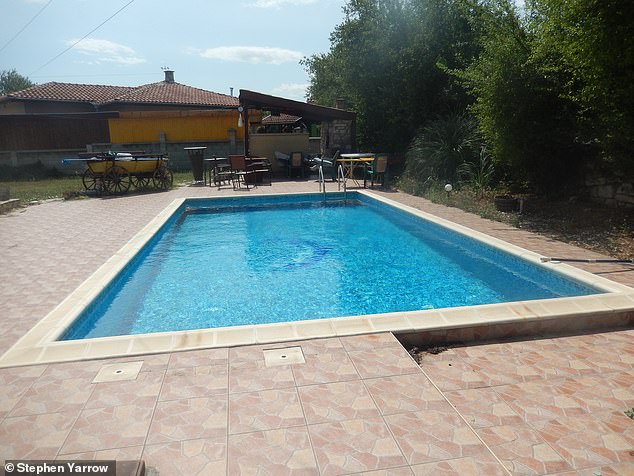
They snapped up a three-bed, two-bathroom bungalow with air conditioning and a swimming pool for £54,000
‘It’s so much better here’, he says, speaking from his home on a video call, wearing a red t-shirt that reads ‘Keep Calm and Move To Bulgaria’.
‘It’s quieter, there’s hardly any traffic, there’s no light pollution at night. I can sit by my pool in the afternoon, have a gin and tonic, and not worry about anything.
‘I very rarely go to synagogue (in Bulgaria), only on the high days and holidays.
‘But when we do go, outside the synagogue there’s a police car with two police officers with firearms. British police don’t supply that kind of service.
‘It’s like it was when I grew up in the 60s, when there were policemen pounding the beat morning, noon and night, and it was safe. I feel very, very safe.
‘I would never come back. If I won £20million on the lottery, I would not come back to the UK.’
The couple plan to spend the rest of their days enjoying everything the Black Sea has to offer, from its sprawling beaches and dirt-cheap restaurants to the comforts of their own swimming pool, complete with poolside bar.
These days, if Stephen heads into the city of Varna – a seaside resort with a population equivalent to Nottingham – he isn’t even afraid to walk the streets at night.
Stephen and Barbara’s move to Bulgaria came about following extensive research into the country’s infrastructure, lifestyle and cost of living – trumping France, Germany, Italy, Spain and even neighbouring Romania.
They eventually settled on their spot close to the Black Sea coast for its quiet location and convenience after driving around the region for two weeks in a hire car with an estate agent in tow.
They’re far enough out from the major city of Varna – where several direct flights to London are available should they ever fancy a trip home – to enjoy their enviable surroundings without feeling completely removed.
A major supermarket is only a short drive away, where a 12-pack of beer is 11.99 Bulgarian lev – around £5 – and a loaf of bread is 99 stotinki, Bulgaria’s answer to pennies, or about 40p.
For those brave enough, chilled rabbit meat – still eaten in the country – is available for £6.50 a kilogram.
‘We eat it in the winter,’ he says. ‘I like rabbit – we cook it in Guinness.’
And even now, more than 13 years later, his bills remain almost insultingly low in comparison to typical British living costs.
‘My council tax is around £30 a year, which is less than I was paying for a week when I lived in London,’ he says. He’s not wrong: council tax on a Band C property in Edgware is £1,809.34 a year as of April – or just under £35 a week.
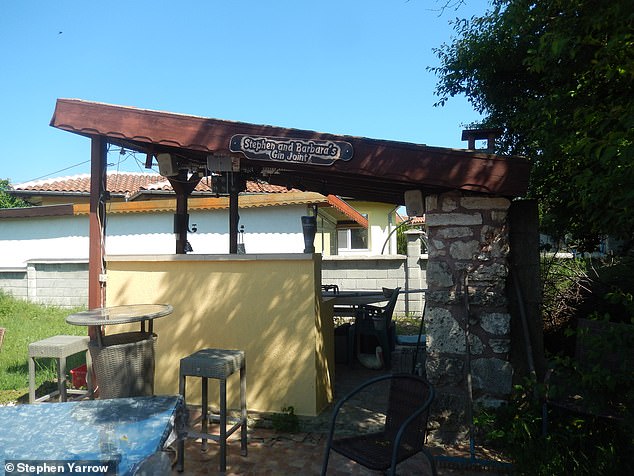
Stephen says it is quieter in Bulgaria, ‘there’s hardly any traffic, there’s no light pollution at night. I can sit by my pool in the afternoon, have a gin and tonic’
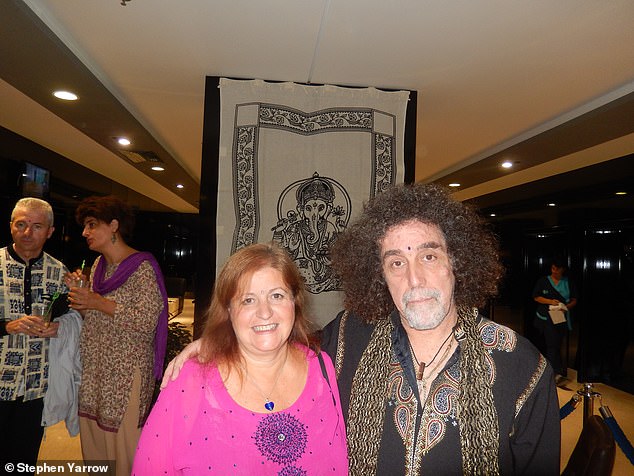
Stephen and Barbara’s move to Bulgaria came about following extensive research into the country’s infrastructure, lifestyle and cost of living
He runs off a list of more, barely believable prices: £13 a month for water, 98 pence a litre for petrol, £40 a year in car tax, £100 a year for car insurance, £100 a year for 90Mb internet, £45 a month for mobile phones, landlines and a 5G internet backup.
Healthcare is subsidised via National Insurance contributions he paid as a working man in Britain – with appointments and blood tests costing a pound or two at a time.
A 20-pack of cigarettes that would cost £14 in Britain is just £2.50.
Living with COPD, Stephen says smoking isn’t for him. A cheeky tipple is another matter.
A litre of vodka? £10. Gordon’s Gin? £11. And if they run out of that, there’s always rakia, the potent fruit brandy that sits at the heart of many a Bulgarian social.
Home brewing of rakia is common but for those without the means, it’s easy to find a still in which to make your own for, in Stephen’s words, ‘a couple of quid’.
‘It’s quite normal to walk around sometimes and see men quite drunk at 11 o’clock in the morning. As long as they don’t cause any problems, don’t come up and say “hey, give me some money”, I’m not bothered.’
The only bigger bill to worry about is electricity: £45 a month in the summer, and £130 for heating in the winter after they gave up burning wood on a stove.
Life, then, is laidback, and it is cheap. But not without its pitfalls.
‘The roads,’ Stephen says, frankly, ‘are crap.’
He’s even less kind about the drivers, and not without cause: the country has the second-highest road fatality rate in the EU, just behind neighbouring Romania.
Many Romanians earn less than 1,000 Euros a month, and some still use donkeys and carts to get around. Road signs warning of animal-drawn carriages are common close to where he lives.
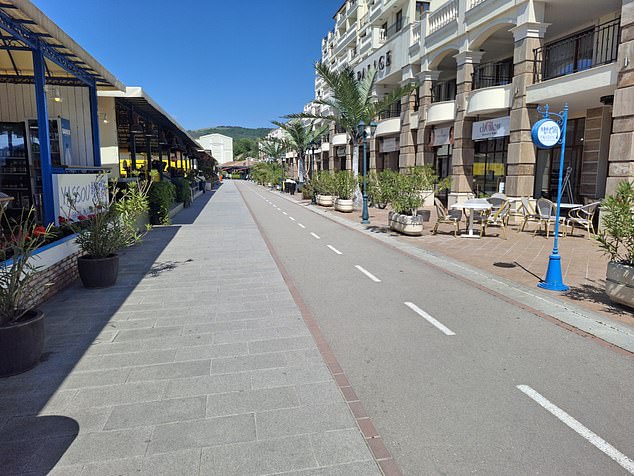
These days, if Stephen heads into the city of Varna – a seaside resort with a population equivalent to Nottingham – he isn’t even afraid to walk the streets at night
As for those who drive, the Foreign, Commonwealth and Development Office even warns Brits to beware of ‘aggressive’ driving, particularly on motorways – where the speed limit is 140kmh (87mph).
It doesn’t help that minor speeding fines incur a fine of just 20 Bulgarian lev – or about £9 – though penalties get tougher depending on how much a driver exceeds the limit.
Driving is even more hazardous in winter, when the already dilapidated roads become death traps and businesses choose to close for months, deprived of the dependable trade of summer tourists.
‘They (Bulgarians) drive like idiots. I’ve driven in the snow, driven in the fog – and they’ll overtake you on blind bends. They’re crazy,’ he says.
His preference in the winter? Stay off the roads, and shut yourself away.
‘You just pull the shutters down and stick a DVD on,’ he says, adding with a grin: ‘A decent bottle of French rose wine is three pounds.’
The water and electricity might be cheap – but that is offset by reliability issues with supplies because the infrastructure is ‘crumbling’, he says. There’s also the matter of drainage, or rather the lack of it: a septic tank is a must.
But some things have changed since he moved there. Relocating isn’t easy post-Brexit. Beforehand, Brits could live, work and study there without a visa – but no longer.
And property costs have spiralled: his £54,000 home is now likely worth almost four times that.
Some Brits are now snapping up the most dilapidated of homes and apartments to do-up as a long-term investment, as the Mail has explored.
And for those hoping to find a Spanish-style little Britain, a home from home where everyone speaks English and the comforts of Britain are at hand, think again: refusing to integrate into the community is a no-no.
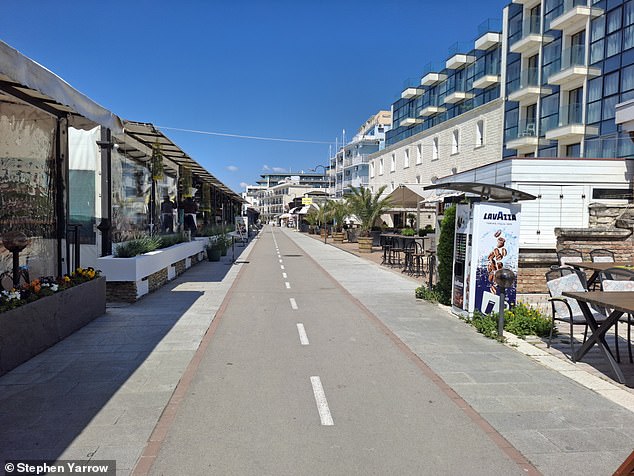
The couple plan to spend the rest of their days enjoying everything the Black Sea has to offer, from its sprawling beaches and dirt-cheap restaurants
Stephen admits he has struggled with learning Bulgarian as he has neurofibromatosis type 1 (NF1), a genetic condition that affects his ability to learn the language – and means he will never be able to apply for citizenship.
However, he and Barbara mix with their neighbours – among them native Bulgarians, Russians, Ukrainians, Norwegians and Swedes, so help with translation when visiting the tax office or the mechanic is never far away.
‘The problems people have are with the Brits that don’t integrate,’ he adds.
‘They all go to the same bar every week, they only drink with Brits, they only socialise with Brits, and they get nowhere pleasant.’
The one thing he finds is lacking in his corner of Europe’s furthest reaches is children – not that he’s bothered.
‘I’m not very keen on small children, to be honest. And I certainly wouldn’t have them in my pool, because they tend to wee in it,’ he says.
Speaking from experience? ‘Unfortunately.’
On the subject of squabbling children, he finds himself watching helplessly as the main Bulgarian parties fail to agree how to govern after no less than three elections in the last year.
Plans to abandon the lev and join the Euro – potentially without a referendum – have sparked fury among nationalist parties.
Despite supporting the centre-right GERB party, one of three currently in charge of the country, he is voiceless amidst the chaos, deprived of the right to vote in Bulgaria post-Brexit following a court ruling that may yet be reversed.
While unable to vote, he successfully supported his neighbours in convincing the local mayor to cancel plans to permit the construction of a German wind farm close to his home.
As a whole, he still insists he’d rather be in Dobrich than London.
‘I was very upset when Labour got in, because I think they’re just going to tax everything to the hilt, and people will just get more and more poor,’ he says.
‘If I’m ever in the UK now, I tend to use Ubers. Black taxis are just ridiculously expensive and I wouldn’t go on the Tube now. No, too dangerous. I do not feel safe.’
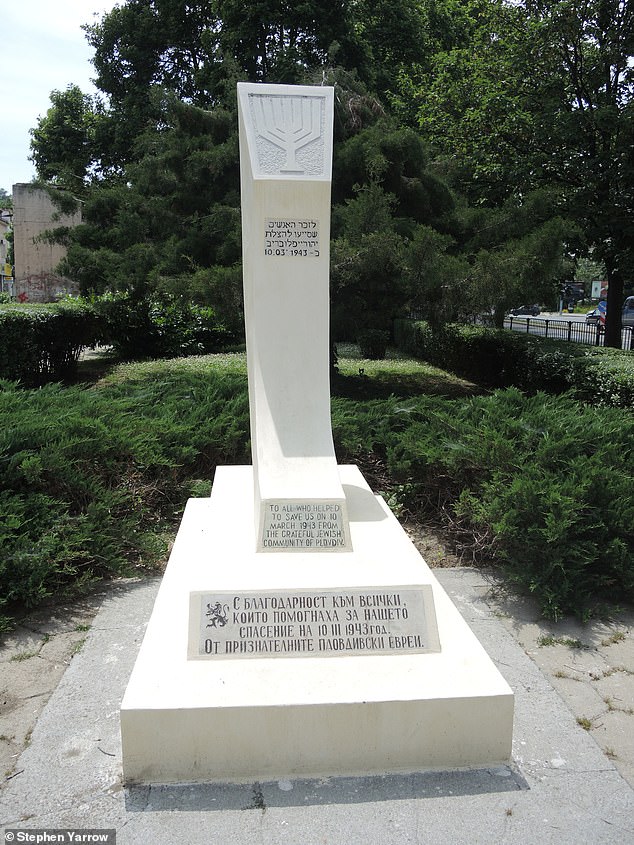
A Jewish memorial which is inscribed with a menorah which reads: ‘To all who helped save us on March 10, 1943. From the grateful Jewish community of Plovdiv’
Safety remains a consideration in Bulgaria, and one of Stephen’s less desirable monthly outgoings is the £30 he forks out for private, armed on-call security to protect the house from what he deemed more ‘jealous’ locals.
‘Without being rude, the cheaper villages are full of gypsies, and that can be a problem,’ he says.
Around 10 per cent of the country’s population are Romani travellers, who largely live in poor quality housing.
Local authorities have been demolishing Roma settlements, sparking international condemnation, while the EU and the Council of Europe spend millions on ROMACT, a programme meant to support their integration into Bulgarian and Romanian society.
Nevertheless, Stephen claims they can be opportunistic: ‘If you’ve got money and a nice car, and they haven’t, they might turn you over if you’re away for a long time.
‘It’s quite common for people to have that level of security. Most Brits have it, we’ve got shutters as well and CCTV, and an alarm.’
He’s also wary of stray dogs who ‘get hungry, and if they get hungry they get aggressive’.
He carries pepper spray – legal in Bulgaria under the country’s vague weapon laws – just in case he meets a particularly peckish one, but says he has never had to use it.
The issue of safety also occasionally extends to what he says remains a ‘male-dominated’ culture still remains from the country’s Communist era.
He tells of a friend who was followed home by a drunk Bulgarian man who tried to molest her, the situation ultimately defused by a neighbour.
But he insists: ‘It can happen absolutely anywhere. Even in Mayfair, even in Beverly Hills. It’s relatively safe here.’
Stephen and Barbara were among part of what might considered a second wave of Brit expats to have relocated to Bulgaria.
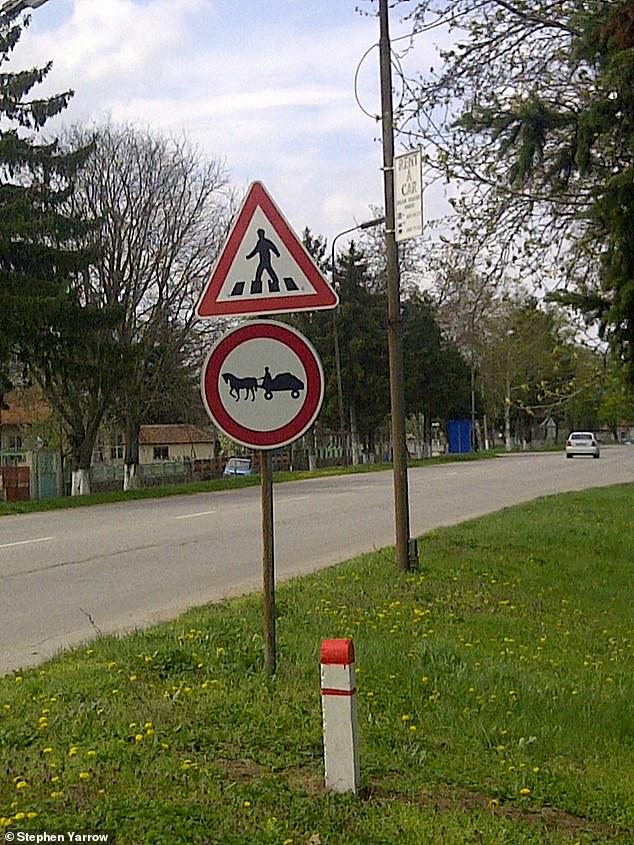
Road signs warning of animal-drawn carriages are common close to where he lives
In 2011, there were 2,605 British citizens living there while retaining their UK citizenship. That shot up to 4,484 in the space of a decade – at an average rate of four a week.
Some estimates run far higher, but he reckons some left in the wake of Brexit, or when their other halves died. He, of course, has no plans to leave at all.
‘It is a gamble, it is a huge gamble,’ he says of moving out there.
‘It was frightening because it could have not worked out. One of my friends said to me, “You’ll be back in three months, you’ll be bored.”
‘Am I? Not a chance.’












